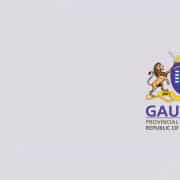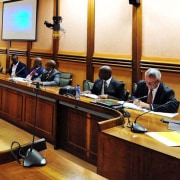|
Getting your Trinity Audio player ready...
|
 Financial woes plaguing local government create an ideal environment for fraud and corruption to fester, the South African Municipal Workers Union (Samwu) said this week.
Financial woes plaguing local government create an ideal environment for fraud and corruption to fester, the South African Municipal Workers Union (Samwu) said this week.
This was in reaction to Auditor -General Terence Nombembe’s statement that financial controls in government departments are slipping, particularly in municipalities. He was talking at a public sector forum convened by the Institute of Internal Auditors on Monday.
“It is distressing that the level most responsible for service delivery, particularly to the poor, seems to be the weakest link,” says Corruption Watch’s spokesperson Bongi Mlangeni.
“We receive too many reports about maladministration, mismanagement of public funds and abuse of resources by officials at local government levels. It seems there is a need to rethink how systems of accountability can be applied at these levels,” she adds.
Corruption Watch’s own statistics have shown that the highest incidence of graft happens at local government level, with 22% of reports received from the public in the organisation’s first year implicating municipalities. The next hotspot sector-wise was traffic police, followed by education, health, the South African Police Service and housing.
Corruption Watch is also concerned that reports from small towns make up 42% of the total number of incidents reported to the organisation in the last year, figures that tie in with the auditor-general’s findings.
Corruption means municipalities can’t deliver
Only 18% of South Africa’s 278 municipalities got clean results from Nombembe’s last local government audit, which was done in 2012. Out of the 278, eight are metropolitan municipalities, 44 are district and 226 local municipalities.
Nombembe has found that municipalities are failing to provide credible and quality information in their financial records. His office conducts annual reports of all municipalities to verify their compliance with the Municipal Finance Management Act (MFMA).
In reaction to Nombembe’s statement, South Africa’s largest union representing municipal workers, Samwu, expressed that local government is not functioning as it should be.
“It is riddled not only with financial woes, but also with corruption, maladministration and a lack of accountability,” said spokesperson Tahir Sema. There is no doubt that corruption plays a big role in municipalities not being able to rise to the occasion and deliver on their mandate and legislative responsibilities of reporting on their financial performance as required by the MFMA.
Within the municipal sector, procurement irregularities are rife – Corruption Watch’s own statistics show. Other reported corrupt practices in municipalities are channelling funds into personal bank accounts, using political influence to ensure certain officials escape prosecution, stealing equipment and supplies, and distributing food parcels and funds to secure votes in local government elections.
Durban’s eThekwini Municipality was recently thrown into the spotlight after the arrest of businesswoman Shauwn Mpisane, whose alleged dodgy relationship with the municipality led to tender irregularities involving her company, Zikhulise Cleaning, Maintenance and Transport.
The City of Johannesburg has also had its fair share of scandals, with the latest allegation being that a R1.25-billion tender for electricity meters went to President Jacob Zuma’s benefactor, Vivian Reddy’s company. It has been suggested that the CEO of City Power is friends with Zuma, the Mail & Guardian reported last week, but the CEO denies this.
Another municipality in trouble is Nala in the Free State, which made headlines in January when Treasury announced it would suspend funding. This has since been lifted, but the findings of a forensic report compiled by KPMG point to wide-scale fraud and corruption which went unchecked for years while the municipality failed to get its financial affairs in order.
In November last year the Department of Cooperative Governance and Traditional Affairs (Cogta) presented an action plan, Operation Clean Audit, to parliament to improve financial audit outcomes for municipalities in the 2012/13 financial year.
The plan will bring together teams from provincial Cogta departments, their Treasury counterparts and officials from municipalities. Their immediate task will be to monitor the clean-up of performance processes that have in the past led to unfavourable audits.
One of the focal areas of Corruption Watch’s 2013 strategy is exposing corruption in small towns. The organisation encourages communities to report corrupt acts through a variety of platforms, including SMS, online, phone or fax. For more details, click here.









